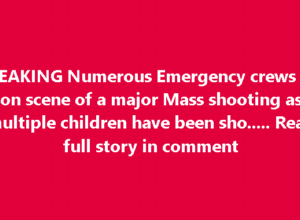I woke at 2:03 a.m. to the blue pulse of my phone and a feeling like I’d been yanked out of a riptide. Eighteen missed calls from my daughter. A text I could see even before my thumb unlocked the screen:
Dad, help! Come fast!!
I was out the door before my mind caught up to my body—wallet, keys, still in the pajama pants I wore to fall asleep on the couch after the late game. The streets were ink-black, my headlights carving a frantic tunnel. I ran three lights I would never admit to, rehearsing catastrophes: an ambulance, a broken window, my daughter on the floor. The steering wheel shook with how hard I was holding it.
When I pounded on her apartment door, she and her fiancé answered looking like deer startled by a camera flash. My daughter grabbed my wrist.
“Dad, what’s wrong?”
“You texted me,” I said, my voice already unraveling. “You called—eighteen times.”
“We were asleep,” she said, confused eyes flicking to the oven clock. “I never texted you.”
Something icy slid down my spine. Her fiancé showed me his phone—no outgoing calls. My daughter scrolled her messages and handed me the screen. No sent texts.
“You should go home,” she said gently. “You look… scared.”
I hugged her, embarrassed and grateful she was whole, then walked back to my car on rubber legs. I sat, got my breath back, told myself I was losing it. My thumb was moving to call my wife when the phone buzzed again.
I remember what you did.
Just ten words, but the force of a freight train. No contact name. An area code from a place I had trained my brain never to think about: Abingdon. Two states and a lifetime away.
I stared at the message until the letters blurred. Deleted it. Started the car. Drove home on autopilot.
Another text arrived while I was fumbling my keys at our door.
A photo.
Me, seventeen, crooked grin, greasy hair—that old varsity hoodie—standing in front of my dad’s hardware store. A sun-faded sign behind my shoulder read SHARMA & SON. I could smell the aisle with fertilizer and paint thinner just looking at it.
Then another text, right beneath:
You still sleep okay?
My hands wouldn’t stop shaking. I slid the phone into my pocket like it was a hot coal, drifted to our bedroom, and lay down next to my sleeping wife. I kept my eyes open until the ceiling grew lighter and morning found me still awake.
I didn’t tell her. Couldn’t. There are old stories I’ve always told as jokes and others I’ve glued shut, imagining the glue would harden into silence if I never picked at it. Why I never go back to Abingdon for reunions. Why I ghosted my high school friends. Why I flinch when someone mentions the class of ’98.
The texts came every night at 2 a.m., as precise as a metronome.
You looked the other way.
She cried for help.
Do your hands still smell like gasoline?
By night four, my appetite was gone. Coffee tasted like pennies. I kept seeing her face, a face I had only allowed to flicker at the edges of memory for twenty-five years, back when our town still smelled like wet leaves and diesel and my father’s honest sweat.
Her name was Sarika.
She’d arrived junior year with a backpack and an aura of guardedness, like a cat that dared you to approach and dared you to flinch. She sat in the back row, oversized hoodies, hair pinned up haphazardly, eyes that always seemed to be scanning for exits. Rumor said her mother had died and she’d moved in with relatives. Rumor said other things too, because rumor is a lazy god in small towns.
We were idiots—me most shamefully. We had the swagger of boys whose parents’ last names opened doors. My best friend then was Collin, a councilman’s son who liked to test boundaries the way other kids tested trampolines. He had this way of laughing that felt like a dare. I didn’t like half the things he did. I never stopped him either.
Senior year, chemistry lab paired him with Sarika. He flirted; she gave him nothing. His interest curdled into contempt. It started small: snide comments about her clothes, her “attitude.” It grew: whispers at lockers, rumors that traveled like wildfire licked by wind. I watched. I didn’t add fuel. I didn’t put it out.
Then there was that Friday behind the football bleachers—our spot for cheap beer and cheaper bragging. Collin showed late, eyes bright, jaw tight.
“She reported me,” he said, like he was amused and insulted at once. “She wants a war.”
He led us to her street, a block where porches were close to the curb and every house wore the same tired aluminum siding. He told me to wait by the car, said it was just eggs. I believed it because I wanted to.
The gasoline smell hit before the sound of the cap clattering on concrete. I ran, heart pounding in my ears, and saw him on her front steps, a red plastic can in one hand and a cheap flicker lighter in the other. Gas darkened the wood like a spreading bruise.
“What the hell are you doing?” I yelled, shoving him so hard his shoulder hit the post.
He laughed. “Relax. She’s not home. I checked.”
The lighter felt heavier than a gun in my palm when I wrestled it from him. I could hear my breath in the cold. I threw the lighter into the hydrangeas hard enough that my elbow hurt. I grabbed his hoodie and hauled him back to the car.
“If you ever do this again,” I said, my voice shaking, “I’ll go to the cops.”
He stared, surprised. Then sneered. “You won’t.”
I didn’t know if he was right. I wish I didn’t.
We didn’t speak after that. A week later, Sarika was gone. Dropped out, rumor said. Moved back north, rumor answered. The guidance counselor said nothing; the principal said less. The halls swallowed her absence the way they swallowed spilled milk and small fights.
I buried the night under time and geography and the careful work of becoming a man who owned a business and attended PTA meetings and held his temper. I told myself a version of the story where I had stopped him, and under that truth I tucked every lie I needed.
So when the text came—You didn’t throw the lighter because of her. You did it to save yourself—it landed like a diagnosis you knew before the doctor said it.
I typed back: Who are you?
No answer.
I called Collin the next morning. I didn’t think his number would still work. It did. He sounded older, softer, as if life had sanded his edges and left the bitterness.
“What,” he said, the word a sigh, “do you want?”
“Have you been getting texts?” I asked. “About Abingdon. About her.”
Silence stretched thin.
“What are you talking about?”
“Don’t do that,” I said. “Sarika.”
A long inhale. Then, quietly: “She’s dead, Adarsh.”
My name sounded strange in his mouth after two decades.
“What?”
“I looked it up years ago. Chicago. 2012. Hit by a car.”
I hung up and searched until the glow of my screen burned my eyes. There it was: an obituary as stark as a headstone. Sarika Mehta. Age 32. No photo. No family listed. A line about a memorial fund with an address that didn’t exist anymore.
It felt like someone had stolen the chance to be sorry to her face.
The next day, a brown padded mailer sat on my office chair. No return address. Inside, a USB drive and a note on unlined paper: Watch everything.
My hands were slick by the time my desktop recognized the drive. A folder named BUSH CAM. Four video files, time stamped. The first opened to grainy black-and-white footage: my seventeen-year-old self lunging, shoving, grabbing the lighter, the violent tilt of the world as the bush jostled. Gas pooling on the porch steps like an accusation.
I watched my jaw clench. Watched my own hands. Remembered the smell so vividly my eyes watered.
The second clip: the next night. Headlights slide across siding. A girl steps into the frame. A bruise blooms under one eye in the monochrome wash. Sarika moves like someone learning to carry a new weight.
She squats, parts the hydrangea, picks up the lighter. Turns it over thoughtfully, like a coin, like a word in a mouth you’re getting used to saying. She looks straight into the camera—the bush a confession booth—and her lips move. The audio is useless, just rush and hiss. But I could swear her mouth made the shape of thank you and then why and then go.
I sat without moving until the office lights shut off automatically around me.
That night I told my wife. I told her about the texts, the porch, the lighter, the way shame grows roots. I expected anger. She gave me a long, tender quiet instead, then pulled me into her, my face in her shoulder like I was the child.
“Okay,” she said at last, practical and gentle, her favorite combination. “So what do we do now?”
I called the number again the next morning. It rang twice and picked up.
“Hello?” A man’s voice, wary, carrying a trace of the same coastal cadence I remembered in Sarika’s.
“I’m Adarsh,” I said, the word catching. “Who is this?”
“Zubin,” he said. “Her cousin.”
We found a rhythm by accident—he asked questions like he was taking a pulse; I answered like I was digging out splinters. He told me Sarika moved in with his family after her mom died. That Abingdon was supposed to be a fresh start and turned out to be the opposite. That she never stopped writing—spiral notebooks, cassette tapes—because some stories rot you if you keep them inside.
“She wrote about you,” he said. “Said you didn’t laugh. Said you shook. Said she wished you’d done more and still—she didn’t blame you.”
The worst and kindest sentence I’d ever been handed.
“Then why the texts?” I asked.
“To wake you up,” he said simply. “Not to hurt you. People like us—we carry ghosts until our backs break. But if you look straight at a ghost and name it, sometimes it stops clawing.”
He sent an audio file. Tape_10_1999_SARIKA—A.M.
I listened on our back steps while the first birds negotiated the morning. A hiss, then her voice—aged by tape, young in the only way a voice can be: soft, steady, perhaps a little surprised at its own steadiness.
“Adarsh,” she said. “Maybe you never hear this. Maybe it sits in a box under Zubin’s bed, and that’s okay. I needed to say… when he came to my porch, I thought, ‘This is it. This is where I disappear.’ I was so tired of being brave. And then you stepped in. You looked as scared as I felt.”
A breath. A rustle.
“I wish you’d told someone. I wish anyone had. But I also know boys like you don’t get taught how to be a wall. Only how to be a window. I left because I needed to survive,” she said. “Not because of you. Because Abingdon is a place that teaches women to be small and men to be forgiven. I hope you build something where your daughter never has to be brave in the ways I did.”
The file clicked off. I sat there until the sun was high enough to touch the fence.
The next morning, I took a week off. I drove to Abingdon, past the new strip mall where the old one had died, past the playground where the merry-go-round squealed, past my father’s hardware store that was now a vape shop with a crooked open sign. I walked the school’s long hallway with its fresh coat of paint and the same old trophy case. The guidance office had a new couch. The air still smelled like pencil shavings and floor wax and hormones.
I asked the principal if they had a formal harassment-prevention program. He sighed the sigh of a man who knows he should and doesn’t. I asked if they could use one. He smiled as if I’d offered to rebuild the gym with my bare hands.
I didn’t have bare hands anymore. I had a business. Contacts. Money. Guilt I could finally aim.
We called it The Sarika Project. A wall, not a window.
We started with training: how to speak up without getting yourself hurt; how to intervene without being a hero; how to take a report like it mattered because it does. We paid for a proper counselor, not just a guidance counselor good at scheduling. We set up an emergency fund for kids who needed to switch classes or get legal advice or a ride. We made a scholarship for anyone who reported harassment and still graduated, not as hush money but as an acknowledgment of courage.
Zubin flew in for the launch. He brought one of her spiral notebooks, a tape recorder with a new set of batteries, and a hug that clicked something back into place in me. He spoke that night in the auditorium under a banner with her name. You could have heard dust settle during his speech. When he finished, a girl with purple hair stood and said, “I didn’t know we were allowed to say it out loud.”
Some days, the good you do feels like a bucket on a house fire. Other days, it feels like a clean shirt after a week of rain. Most days, I just kept showing up. The work makes its own weather if you let it.
I went to therapy. Not the tidy kind. The kind where you pick up the old bones and decide which ones still belong to you. I told my wife everything that memory would hand me. Sometimes I woke at 2 a.m. still, out of habit, and checked my phone. Nothing came.
One afternoon, my daughter texted me from a cafeteria table covered in orange peels and algebra.
Dad, I told my friend about the scholarship. Her sister got it. She says thank you.
I walked outside and cried in my car where no one had to be brave about seeing it.
As for Collin—last I heard, he’d tried for city council and lost badly. He posted rants about “witch hunts” and “the old days,” and then he went quiet. I don’t check his page anymore. You can starve some ghosts by not feeding them attention.
On the first anniversary of the Sarika Project, we met in the school courtyard under a sky the precise blue of the stripe on the old gym floor. We unveiled a bench with her name carved into it and these words underneath: Be the wall. A girl I didn’t know left a folded paper crane on the seat and walked away without looking back.
I still keep the USB in a fireproof safe. Not because I’m afraid. Because I finally understand some things are worth protecting even when they hurt.
Sometimes I think the texts chose 2 a.m. because that’s the hour you can’t pretend anymore. Because the mind is honest when the world is quiet. Because you can either let the past tap on your window forever or get up and open the door.
I don’t sleep like a saint now. But I sleep like a man who’s learning how to carry weight the right way—on my shoulders, not buried in my chest.
If you’ve read this far, do one thing for me: don’t look away. When the small bad thing happens in front of you, be the wall. If you didn’t last time, be it next time. Shame can rot you. Or it can be compost.
The difference is what you do with it.
If this found something in you, share it. Someone else might be waiting for their 2 a.m. to finally mean something.





